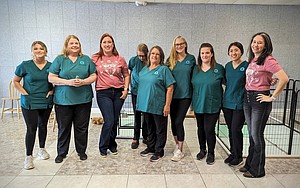9/11/2023

Parvo Treatment Center, a local nonprofit organization committed to delivering cost-effective, top-tier parvovirus treatment solutions for dogs and puppies, recently marked the grand reopening of its advanced treatment facility. Formerly known as Pearland Parvo Recovery Center, this facility, established in 2019, initially served as an inpatient rehabilitation hub for animal rescues and shelters seeking specialized parvovirus care for canines. Following a temporary closure, the center has re-emerged thanks to a substantial $75,000 grant secured by Houston PetSet, reaffirming its dedication to serving the animal welfare community.
Canine parvovirus poses a significant threat to all dogs, with unvaccinated canines and puppies under four months old being the most vulnerable. This highly contagious virus, while preventable, lacks a cure; thus, the only recourse is diligent symptom management. Parvo Treatment Center specializes in providing this essential protocol, ensuring that animal rescues and shelters can safeguard their other animals.
Situated at 15060 Hwy. 6 in Rosharon, Texas, the Parvo Treatment Center primarily caters to dogs under the care of rescues and shelters. With a professional team of nine and a dedicated group of volunteers, the center accommodates an average of 40 to 50 dogs each month. Additionally, the center actively engages in community outreach to raise awareness about parvovirus prevalence and the critical importance of regular vaccinations.
Founder of Parvo Treatment Center, Jeanette Savage, expressed gratitude, stating, "The generous contribution from Houston PetSet and its supporters has empowered us to relocate to a more expansive facility, expand our community services, and extend our care to dogs and puppies afflicted by parvo. To date, thanks to Houston PetSet's unwavering support, we've rescued and treated over 902 dogs and puppies. We eagerly anticipate increasing these numbers significantly in the future and aspire to a day when our services are no longer required."
